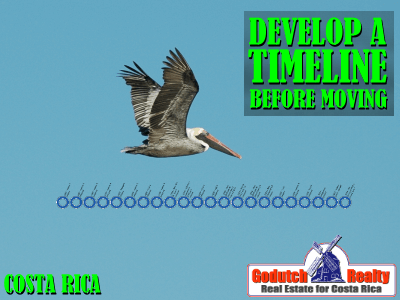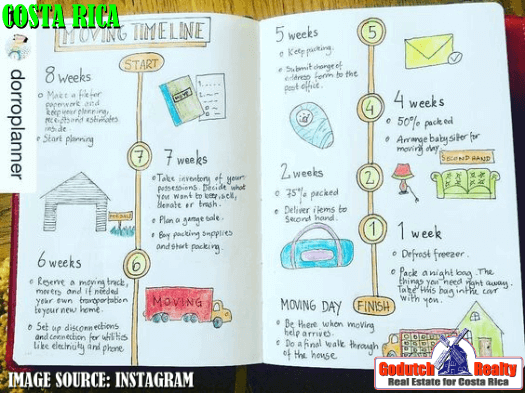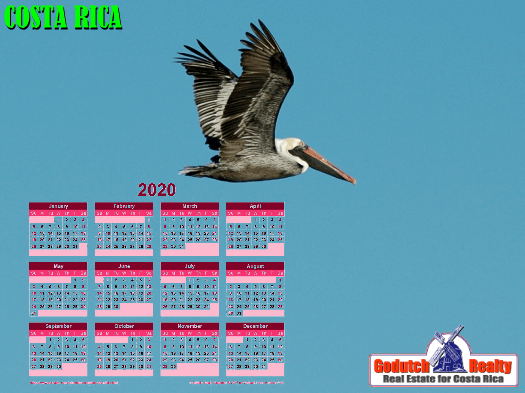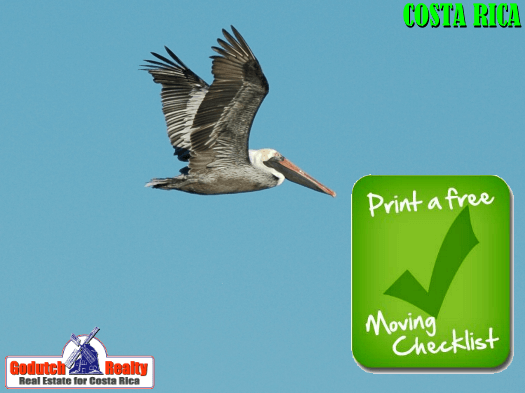Estimated Reading Time: 6 Minutes

When you move to another country, it’s important to create a timeline for your plan.
If you are changing countries, there’s a pot full of planning, changes, and notifications that need to be implemented. This is necessary to achieve a successful and less stressful transition.
In my last blog, I mentioned where to look for general templates to use to create your timeline. A good timeline will suggest how far ahead to notify your credit card providers. Of course, you want to know when to notify utilities of service cancellations when to notify the post office of your change address. Also, when to notify your banks, investment companies, insurance companies, and financial institutions.
If you are planning to immigrate to Costa Rica or any other country, they will advise you when to start obtaining documentation.
Maybe you can see some obvious gaps and omissions. None of the timeline lists can address your specific needs or timing. They will help you get started, but they address common general timing requirements. Your needs are unique and your move is unique. You are going to have some things that are specific to you. The other thing that I found frustrating was the general recommendations you receive from websites are not based on reality or void of much common sense.

Not based on reality
Let me explain. Here’s the best example I can use: every website or organization tells you to come down here for a year and rent a place. They tell you to make sure you are really comfortable here before you move down permanently. Wow, that seems like very sound advice on its face.
Lots of questions
In reality, it’s just not practical or in many cases not even feasible.
- How do you really accomplish this if you are not independently wealthy?
- And, if you are independently wealthy, do you just shutter your home or rent it out furnished for a year?
- Does your brother-in-law water the plants, watch after your priceless heirlooms, fix the broken water pipe and manage your affairs while you’re away?
- Where do you store your possessions if you aren’t entirely of independent means?
- Maybe you have to sell your house in order to move to Costa Rica?
- How can you afford to pay your mortgage?
- No matter your financial wherewithal, who manages your affairs and finances?
- How long will you need to return home to sell your home, settle your affairs, make all necessary notifications and get your immigration paperwork in order?
And, and, and…

Some Answers
Do you want to store your furnishings and belongings for six months or a year after you sell your home? Then you will uncover another can of worms.
Here are a few answers:
1. Storage
We found that no international mover is really accustomed to getting the request for 6-12 months of storage somewhere near your home. Especially those servicing you if you are located on the West Coast. Most Costa Rican movers have a presence on the East Coast, but not so much in the West.
2. Internation Mover
Your North American mover is likely to be a subcontractor to your Costa Rican-based international relocator with whom you are contracted. In order for your belongings to be insured for the voyage down to Costa Rica and for dealing with customs when your container arrives, the subcontractor will be bonded. The subcontractor must certify that they personally packed, cataloged, moved, and stored it all in their bonded facility first. Then they re-packed all of your possessions into a container and got them to the dock for shipment to Costa Rica.
Storage
So, forget about saving some money by packing and keeping it in a “U-Store-It” rental unit near home, in case you decide to return from Costa Rica. It isn’t based on reality.
The upside is you don’t have to pack and move. But, you will have a monthly storage bill to put into your budget while you are living in Costa Rica. I have a 40-foot container’s worth of possessions and it is costing me $475 a month for bonded storage on the West Coast.
Back to your timeline
Make a spreadsheet and list:
- Everything that needs an action,
- Every account that needs to be notified,
- Everyone with whom you communicate.
- Get the appropriate notification address and/or phone number. This will help reduce the stress of having to scramble to find it during the chaos leading up to your imminent departure.
Leave yourself enough time to make certain all notifications take effect before or at the time you depart. Be precise and be detailed. No matter how hard you think about it, it is easy to leave someone or something off the list. So, treat this timeline spreadsheet as a living document and update your timeline as often as is necessary.
Immigration policy
There have been some very recent changes in Costa Rican immigration policy. This makes it admittedly more difficult to move and stay here for any prolonged period of time.
As of this writing, they will affect your
- Financial flexibility,
- Budget,
- and, perhaps, the length of time it takes to get your cedula (the official identity card).
These changes were brought on, in part, by the U.S. government’s financial crisis. The desire to be paid all taxes the U.S. is owed including pressure on other governments to track drug money laundering. Plus Costa Rica’s crackdown on malingering undocumented workers and retirees. You can minimize their inconvenience if you plan ahead by creating a sensible timeline.
The Author
The author of this blog, Ticonuevo, is a US expat who moved to Costa Rica and used the services of GoDutch Realty to purchase a property in Costa Rica. In his blogs, Ticonuevo describes his own experiences of taking the step of moving to Costa Rica and getting a new life started.
If you like this blog, subscribe to my newsletter by clicking the banner below.
I DO want to remind our readers that we appreciate any referrals you can send us. Also, remember GoDutch Realty when talking about your home in Costa Rica to friends and family. We appreciate it.


























